|
|
|
Sort Order |
|
|
|
Items / Page
|
|
|
|
|
|
|
| Srl | Item |
| 1 |
ID:
174930
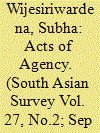

|
|
|
|
|
| Summary/Abstract |
In Sri Lanka, abortion continues to be a criminal offence under the Penal Code of 1883. Several attempts have been made to challenge the colonial-era law since the 1990s with no success thus far. This study documents and centres the knowledge of women and transpersons in accessing abortion and sexual health and reproductive health services in Sri Lanka in order to contribute to the conversation on abortion law reform as well as research and advocacy. Our data suggest that the existing legal reforms proposed to the abortion law would be unresponsive to the needs of women and transpersons in Sri Lanka, and that in additional to legal changes, we would need significant social and cultural changes. This study uses feminist research methodologies, building towards a feminist ethics in abortion research.
|
|
|
|
|
|
|
|
|
|
|
|
|
|
|
|
| 2 |
ID:
160621
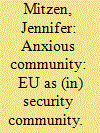

|
|
|
|
|
| Summary/Abstract |
From the Eurocrisis to the migration crisis, and from Brexit to a strengthening far right, the European Union (EU) faces multiple stressors. But while crises unleash anxiety, they do not necessarily portend the worst: because they disrupt old routines, crises can open space for new political possibilities. As a self-consciously hybrid, ‘post-national’ political form, the EU would seem poised to take advantage. Instead it is stuck. In this paper, taking an ontological security approach and focusing on EU migration governance, I propose that one cause of paralysis could lie – ironically – in an aspect of the EU that is crucial to its normative power: Europe’s long peace. An ontological security perspective highlights the management of existential anxiety as crucial to identity, suggesting how different modes of anxiety management have different political effects. Applied here, EU narratives and routines preserving ‘no war’ might suppress relations of structural power; they might mimic primitive defense mechanisms; or they might be symptoms pointing to unconscious processes keeping difficult knowledge – including colonial pasts – undealt with. I suggest how migration governance might manifest these mechanisms, contributing to the difficulties of desecuritising migration and linking its governance to EU values and institutions.
|
|
|
|
|
|
|
|
|
|
|
|
|
|
|
|
| 3 |
ID:
120791


|
|
|
|
|
| Publication |
2013.
|
| Summary/Abstract |
HIV sensitisation campaigns often aim to empower people living with HIV or AIDS (PLWHA) to enable them to cope with their illness by getting on with normal life as best as they can. However, contained within these messages are implicit assumptions about the needs of PLWHA. This research found that in Jamaica PLWHA's reproductive health needs are considered to be met largely by condoms. However, PLWHA respondents in this study expressed desires to have children and felt that their right to this was being denied. As such, dominant HIV sensitisation messages fail to respond to Jamaican PLWHA's own perceptions of their needs. This information is of importance, as the focus of the international HIV response moves away from simply preventing new infections to supporting those who have already been infected through locally appropriate interventions. As part of this, local perceptions need to be acknowledged 'up-stream' in HIV programming.
|
|
|
|
|
|
|
|
|
|
|
|
|
|
|
|
| 4 |
ID:
176988
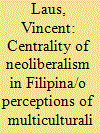

|
|
|
|
|
| Summary/Abstract |
My research focuses on how Filipina/os respond to stigmatisation in Canada and the United States and how those responses are impacted by neoliberal ideology and perceptions of multiculturalism. The research uses in-depth interviews of 58 Filipina/o students in Toronto and Los Angeles to analyse the cultural repertoires available to them that enable or constrain a sense of belonging. Canada offers federally funded multicultural policies toward immigrant settlement and ethnic institutions, compared to the informal approach to multiculturalism in the United States. Nonetheless, the interviewees report that Filipina/os experience stigmatisation on a group level despite efforts to ‘fit in.’ I argue that the dual forces of Western neoliberalism and past colonisation in the Philippines influence tendencies toward either a decolonisation discourse that criticises social structures or a neoliberal discourse that focuses on agency. Perceptions of multiculturalism affect which tendency Filipina/os rely on to mobilise destigmatisation strategies.
|
|
|
|
|
|
|
|
|
|
|
|
|
|
|
|
| 5 |
ID:
164029
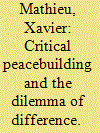

|
|
|
|
|
| Summary/Abstract |
Recent research has revealed the need to include and understand local actors in order to improve the effectiveness of peacebuilding. According to these analyses, peacebuilding could become more respectful of cultural differences thanks to a genuine engagement with the specificities of the local. Empirical studies of the ‘different’ local have thus flourished in the field with the ambition of countering the universalist tendency of traditional peacebuilding. Through the use of the concept of ‘dilemma of difference’, this article challenges this intuitive argument and argues that these approaches risk reproducing a stigma attached to the ‘different’ local. Indeed, emphasising difference in order to ensure its respect means separating and reifying ‘it’ as a deviation from the norm(al). As such, this analytical strategy is likely to recreate the stigma that contributed to the exclusion of local actors in previous peacebuilding practice and research. In contrast, I outline three strategies for studying difference differently in peacebuilding: focusing on the institutional arrangements that enabled specific differences to emerge and become visible; recognising that these differences are internal to peacebuilding (and thus an unlikely source of alternative and emancipation); and revealing the unstated and implicit Self for/from whom local difference is relevant.
|
|
|
|
|
|
|
|
|
|
|
|
|
|
|
|
| 6 |
ID:
177004
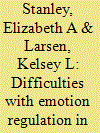

|
|
|
|
|
| Summary/Abstract |
The ability to regulate negative emotions is especially necessary for service members in the contemporary U.S. armed forces, since they routinely face situations that elicit negative emotions while executing their professional roles. Yet difficulties with regulating emotions, which are associated with stress and mood disorders, suicidality, and impairments in work performance, remain prevalent across this group. This article surveys research in five domains—recruitment and selection effects, military cultural pressures and coping strategies, training, common chronic stressors, and the contemporary operational environment—to highlight structural contributors to the heavy stress loads that U.S. service members often bear, which may contribute to their difficulty with emotion regulation (ER). It concludes with several recommendations that the military could implement to mitigate service members’ stress loads and facilitate ER. Enhancing their ER skills may offer a long-term strategy to improve their resilience and performance.
|
|
|
|
|
|
|
|
|
|
|
|
|
|
|
|
| 7 |
ID:
169781
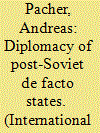

|
|
|
|
|
| Summary/Abstract |
Why do post-Soviet de facto states (such as Abkhazia and South Ossetia) regularly interact with remote Pacific islands or Latin American countries, even though they are not bound by any meaningful political, economic or military ties? This article argues that the diplomatic relationship management amounts to a strategy of external legitimacy-building through stigma rejection and ontological security-attainment. This diplomatic practice creates positively tinged social affiliations, whereby the unrecognized entities aim to have their identity as ‘normal’ states affirmed. It renders the international society’s stigma ineffective, thus facilitating a potential exit from the stigma. By illuminating the performative aspects behind the de facto states’ quest for recognition, this article uncovers the de facto states’ agency and analytically emancipates them from the structural factor of ‘Russia-as-a-great-power’. It also contributes to the literature of ontological security by highlighting how positive (rather than conflictual) relationships, and how transformed (rather than stable) identities can be conducive to its attainment. This article generally highlights the need to analyse de facto states’ foreign relations more holistically than previously done.
|
|
|
|
|
|
|
|
|
|
|
|
|
|
|
|
| 8 |
ID:
188586


|
|
|
|
|
| Summary/Abstract |
In 2019, the government of Taiwan legalized same-sex marriage, the first to do so in Asia. Yet, despite its celebration as a sign of liberal progress, legalization appears at odds with the results of referendums that show a majority of Taiwan citizens oppose LGBTQ acceptance, following a steady decline in tolerance for LGBTQ people in Taiwan. To explain this, this article adopts a Goffmanian micro-sociological approach to interrogate LGBTQ experiences of stigma and discrimination in their networks. Using narrative and go-along interviews with LGBTQ people in Kaohsiung, Taiwan in 2019, this article shows (1) latent forms of discrimination in families and at workplaces, (2) the intensification of discriminatory scrutiny within these spaces in the wake of legalization, (3) mental health consequences, and (4) social enclaves that offer some reprieve from discriminatory pressures. This article identifies a need for greater resource allocation to create safe spaces for members of the LGBTQ community and anti-discrimination policies to combat the capillary forms of discrimination that have arisen after same-sex marriage legalization.
|
|
|
|
|
|
|
|
|
|
|
|
|
|
|
|
| 9 |
ID:
133835
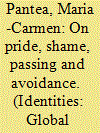

|
|
|
|
|
| Publication |
2014.
|
| Summary/Abstract |
Roma ethnicity is one of the most stigmatised identities of today's Europe. An emerging discourse on 'Roma pride' aims to reshape this widespread perception, especially among the educated youth. Drawing on 57 interviews with young people with/in higher education in Romania, this article looks into their experiences of self-identification as Roma. On the one hand, this article identified a tendency for young people to move in a conceptual space, dominated by an understanding of ethnicity as bounded and static. On the other hand, it identified an emerging tendency for flexible, hybrid identifications that deliberately avoid reifying ethnicity (e.g. being a Roma of a different kind and living beyond ethnic labels). The article calls for more informed approaches addressing ethnic identification, which avoid assumptions of stable identification and embrace more complex understandings of the social dynamics involved.
|
|
|
|
|
|
|
|
|
|
|
|
|
|
|
|
| 10 |
ID:
164041
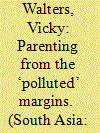

|
|
|
|
|
| Summary/Abstract |
Sanitation work is considered highly polluted in Hindu society and the stigma inflicted on sweepers and manual scavengers (safai karamcharis) extends to their children. This paper examines how safai karamcharis navigate parenting from the ‘polluted’ margins. It explores strategies adopted to protect children from stigma and explains how these strategies are temporal and partial. It also discusses the hope parents place on education for their children’s social mobility but how securing quality education is fraught with challenges, and that while education is necessary it is insufficient for the children of safai karamcharis to achieve social mobility and freedom from caste-based occupational rigidity.
|
|
|
|
|
|
|
|
|
|
|
|
|
|
|
|
| 11 |
ID:
167794
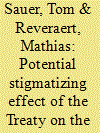

|
|
|
|
|
| Summary/Abstract |
On July 7, 2017, seventy-two years after the start of the nuclear era, 122 states concluded the Treaty on the Prohibition of Nuclear Weapons (TPNW, or “ban treaty”). The treaty forbids the development, production, acquisition, possession, transfer, testing, use, and threat of use of nuclear weapons. Advocates of the TPNW understand that it will not automatically lead to a world without nuclear weapons. The treaty’s main goal is to stimulate a societal and political debate inside the nuclear-armed states and their allies by strengthening the antinuclear norm and by stigmatizing nuclear weapons and their possessors. This article assesses to what extent this process of stigmatization might take place. It starts by elaborating on the concepts of stigma and stigmatization. It then matches the concept of stigma with nuclear weapons, and with the humanitarian initiative behind the momentum that led to the TPNW. The article concludes by looking to different stigma-management approaches that can be used by the nuclear-armed states and their allies.
|
|
|
|
|
|
|
|
|
|
|
|
|
|
|
|
| 12 |
ID:
190085
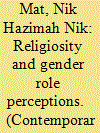

|
|
|
|
|
| Summary/Abstract |
This study explores how religiosity has shaped gender role perceptions in modern Malaysia. As part of a major research on gender equality in Malaysia, this paper discusses findings from male respondents on their gender role perceptions in regard to their experience as working fathers. This research employed a case study approach and interviews with working fathers on the perceptions of their role and their wife’s role as working mothers. Using Leximancer text processing, the interview data were analysed and formed a basis for data structure development based on Gioia’s data analysis framework. Religiosity is regarded as a main influencer shaping men’s perceptions of gender role. However, religiosity is often overrated when justifying the inappropriateness of gender attitudes. Culture embedded in individual values forms a strong foundation in society to shape the stratification system on their own. This study’s findings highlight misconceptions about Islamic teachings as a hindrance to gender equality. Instead, Islamic teachings clearly noted the equality of every human being regardless of gender differences. The study’s implication is discussed in relation to the negative impact of stigma by association, which develops a long-lasting effect towards Islam inculcating movement towards gender equality. Islam is applicable and relevant across time, although society is changing into the modern era if the transmission of the sharia (Islamic jurisdiction) is done appropriately to form a strong understanding of correct practices.
|
|
|
|
|
|
|
|
|
|
|
|
|
|
|
|
| 13 |
ID:
167193
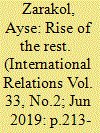

|
|
|
|
|
| Summary/Abstract |
The past decade has been characterised (among other things) by the emergence of a discourse about the ‘Rise of the Rest’. (Some) non-Western states have been described as ‘rising powers’ capable of agency in the international system and as potential partners for the West in global governance. This stands in contrast to a more traditional narrative that saw the non-West primarily as a source of international problems and a developmental project. Does this discursive shift signify a historic reversal in how the non-West understood by the West? The answer is complicated. In this article, I argue that the hype about ‘rising powers’ in Western policy circles following the Global Financial Crisis of 2007–2008 had little relation to an ‘objective’ analysis of actual structural shifts in favour of ‘the Rest’ and was more akin to a financial bubble, with speculation driving perceptions of ‘rising powers’. I also show that the ‘rising powers’ literature is better located within the broader (and long-standing) debate about the decline of the United States, and should be read more as a manifestation of American anxieties and hopes than as informing us about the choices or the motivations of the ‘rising powers’. Ironically, however, the Western hype nevertheless has helped along a structural shift that is under way, first by partly moulding reality in that direction (especially in the form of financial decisions), but more importantly by freeing non-Western powers (for better or worse) from their internalised cages of perceived inferiority and lack of agency in the modern international order.
|
|
|
|
|
|
|
|
|
|
|
|
|
|
|
|
| 14 |
ID:
181144
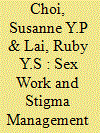

|
|
|
|
|
| Summary/Abstract |
This paper examines the impacts of state policies and NGO advocacy on female sex workers’ identity and how they manage stigma. Comparing three groups of sex workers – those born and working in mainland China, those born and working in Hong Kong, and those born in mainland China who later migrated to Hong Kong and entered the sex industry – this paper suggests that differences in state policies on prostitution and the different degrees of visibility of NGOs campaigning for sex workers’ rights are related to three strategies used by sex workers to construct a positive self-image to counteract the stigma they face: gendered obligation fulfilment, professional work and responsible citizenship. The paper illustrates that stigmatized-identity management involves complex relationships among individual interpretation, selection and mobilization of gender, work and citizenship scripts, which are contingent on structural features of the environment and may change during migration and relocation.
|
|
|
|
|
|
|
|
|
|
|
|
|
|
|
|
| 15 |
ID:
177981
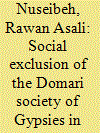

|
|
|
|
|
| Summary/Abstract |
This study looks into the lives of women from the Domari Society of Gypsies in Jerusalem. Residing in a conflict-ridden city and exposed to multiple stigmas, the study exposes the structures that perpetuate the disempowerment of Domari women in Jerusalem. It looks into their neighbourhoods, the social services available to them, the education services that they receive, their opportunities in the labour market, and the marriage patterns in the society. The study adopted qualitative research methods to allow the research participants to narrate their stories in ways meaningful to them. The narratives were analysed through an intersectional lens to expose the multiple oppressions these women are subject to. The women’s stories reveal high levels of stigma and isolation, which have disempowered members of the community and perpetuated the cycle of their exclusion.
|
|
|
|
|
|
|
|
|
|
|
|
|
|
|
|
| 16 |
ID:
138762


|
|
|
|
|
| Summary/Abstract |
The term ‘resilience’ has grown in its usage across a range of disciplines and practices.
The US military and the British armed forces have typified this increasing use of ‘resilience’ in recent years within such initiatives as Comprehensive Soldier Fitness (CSF) and throughout British Army Doctrine. However by unpacking what being ‘resilient’ for soldiers might mean we explore the interaction between their personal ‘masculine’ characteristics, the structural environment within which they operate, and the civilian life they return to. In doing so this paper offers a critical sociological analysis combining the agency of the soldiers’ body with the structure of the military as a [total institution] to problematize issues of masculinity, stigma and resilience within the military setting. As such, we question if the fostering of ‘resilience’ in military personnel is something that may be productive during service, but counterproductive thereafter when service personnel return to civilian life as veterans.
|
|
|
|
|
|
|
|
|
|
|
|
|
|
|
|
| 17 |
ID:
186340
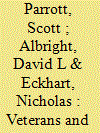

|
|
|
|
|
| Summary/Abstract |
The mass media are an important source of information concerning military service personnel and veterans. Veterans, veterans organizations, and others have criticized the mass media for providing the public shallow representations of veterans and military service in which veterans are heroes traumatized mentally and/or physically by their service. Despite the concern, scant research has empirically examined how exposure to such content affects public perceptions of veterans. Using an experiment, this study examined how exposure to news stories of military veterans informed thoughts, attitudes, and support intentions toward veterans. Results suggest short, one-time exposure to stereotypical news stories can lead readers to perceive an increased likelihood veterans will experience post-traumatic stress disorder and, in turn, feel less desire to be socially close with veterans. However, exposure to a story that challenges stereotypical representations of veterans appears to mitigate the effect. In addition, news exposure can influence support intentions related to veterans.
|
|
|
|
|
|
|
|
|
|
|
|
|
|
|
|
| 18 |
ID:
147072
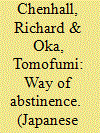

|
|
|
|
|
| Summary/Abstract |
Stigma associated with alcoholism is common in Japan, and individuals who suffer from alcoholism often feel that it is a taboo to discuss their problems with alcohol in the general public. This paper describes the way in which the self-help group called Danshukai offers a model for recovery for people suffering from alcoholism in Japan. Since 2006, the authors have been involved in various meetings and conducted conversational and semi-structured interviews with leaders and rank-and-file members of Danshukai. In Danshukai, recovery is viewed as a spiritual process offering the potential for a new life compared to models offered by medical treatment that place little emphasis on the role of spirituality in recovery. While medical models seek to reduce alcohol-related stigma by viewing it as a treatable ‘disease’, rather than a personality weakness, Danshukai encourages members to embrace their identity as a Danshukai member and to engage with a ‘way of abstinence’ that includes a lifelong commitment to Danshukai activities and helping others with similar problems.
|
|
|
|
|
|
|
|
|
|
|
|
|
|
|
|
|
|
|
|
|